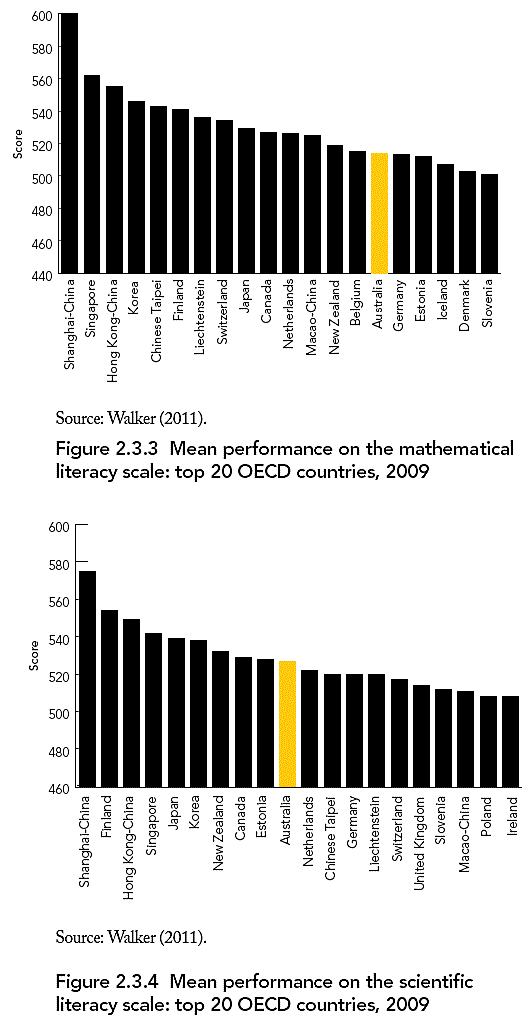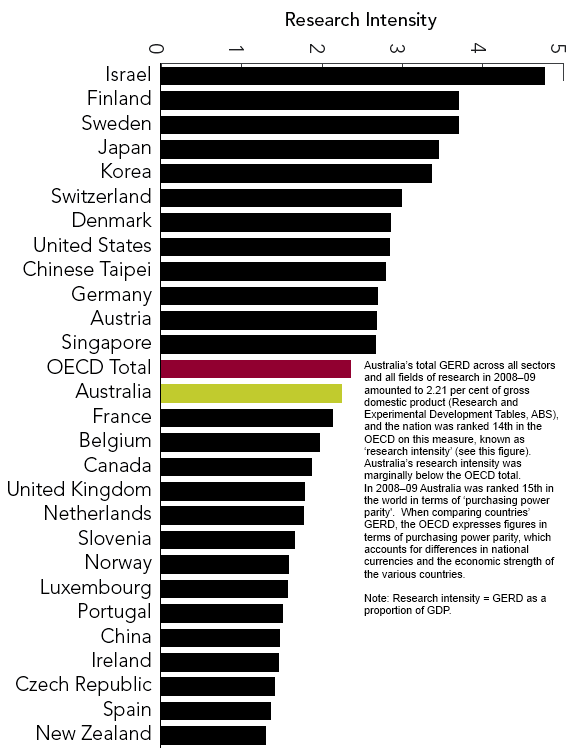|
News & Views item - May 2012 |
![]() Chief Scientist Releases Health of Australian Science. (May 23,
2012)
Chief Scientist Releases Health of Australian Science. (May 23,
2012)
Simultaneous with his address to the National Press Club today, Australia's Chief Scientist, Professor Ian Chubb released his 200 page report on his department's assessment of the Health of Australian Science.
He told his audience: "We should be proud of what our scientists, our engineers and our mathematicians achieve. We are well represented in the international arena; our researchers are some of the most productive in the world, but the future prosperity of Australia is dependent on having a strong supply of graduates in the right areas coming through the education system. There are some areas of expertise that are crucial to our national interest which are lacking what they need to prosper."
And Professor Chubb interprets the statistics his department have gathered for its compendium as indicating that the agricultural sciences, physics, mathematics and chemistry in particular while crucial for Australia’s future are vulnerable and the total numbers in Engineering don’t meet demand. Therefore, developing a more strategic funding system and improving the relationships between science and industry should be priories as well as developing a culture that appreciates a science education, both the students and the teachers of it: "The science degree prepares students for a lifetime of critical thinking, a drive to find evidence and an understanding of how our society fits into the broader picture of the world, all of which are invaluable for the development of a prosperous Australia."
In Professor Chubb's view the release of the report provides the trigger for careful preparation and planning: "The report should lead us to a position where any gaps in our capability will be by design and not the unintended consequence of a failure to notice."
The overall analysis provided by the report deals with:
Science in the nation interest,
Science teaching,
The Science workforce,
International collaboration,
Higher education and workforce data and
Future work.
The overall findings of the report are that "the evidence presented in this report suggests that Australian science is generally in good health. Our school students compare well on the international stage. At present there is growth in science enrolments in universities. Our researchers produce more per capita than researchers in most other nations and have impacts at or above world standard in most discipline areas".
On the other hand the report also compares 15-year-old Australian students based on the Programme for International Student Assessment (PISA) to the top 20 OECD countries, which is surely more pertinent that comparing Australia to the world's 196 nations as our cohort. Surely this ought to send a message to our policy makers that improvement of K-12 STEM teaching is called for.

With regard to public support for basic and strategic research the report has this to say:
In the broadest sense basic and strategic research augments our understanding of the world we live in; it adds to the bank of intellectual capital on which society draws to develop, improve and transform. Applied and experimental research develops this intellectual capital into new technologies and innovative processes that directly improve the health and prosperity of Australia and its citizens... In the past two decades the proportion of the Commonwealth’s expenditure directed to basic and strategic research has steadily decreased, and the proportion directed to applied and experimental research has steadily increased. There is no apparent rationale for this trend.
The figure below (2.5.5 in the report) places Australia as it stood in 2008/09 among its OECD cohort in what is termed Research Intensity where Research intensity = Gross Expenditure on Research and Development (GERD) as a proportion of Gross Domestic Product (GDP).

Quite apart from any other considerations if there is a paucity of support for research and development by a nation it is prima facie a disincentive for the young to have an active interest in being educated to work in the sector, whether in the private sector, public research institutions or the nation's research universities.
While Professor Chubb refrains for making outright recommendations the report suggests the following under:
Further Work
The findings from this Health of Australian Science project raise important questions, for Australian science and Australia generally in the coming decade, that warrant further investigation and national debate:
What are the direct implications for Australia in connection with important national concerns—food security, innovation, our place in the region—if our skills base in crucial science disciplines is further depleted? Can we confidently identify particular areas of specialist skills and research that will be essential to Australia’s future?
Do student choices align with the national interest? Do the fields where we demonstrate research excellence correlate with those areas that are essential to sustaining and building Australia’s position in global science? What should be Australia’s science niche?
What is the best mix of basic and applied research to support the continuing security, health, economic growth and prosperity of Australia and all the nation’s citizens? Across which sectors of the system is this mix of research effort best distributed? Is it sensible to have some of Australia’s most scientifically creative people—higher degree research-trained graduates—largely isolated from commerce and industry?
And we might add, what is the likelihood of our policy makers, current or presumptive, to actively reflect on Professor Chubb's considerations?